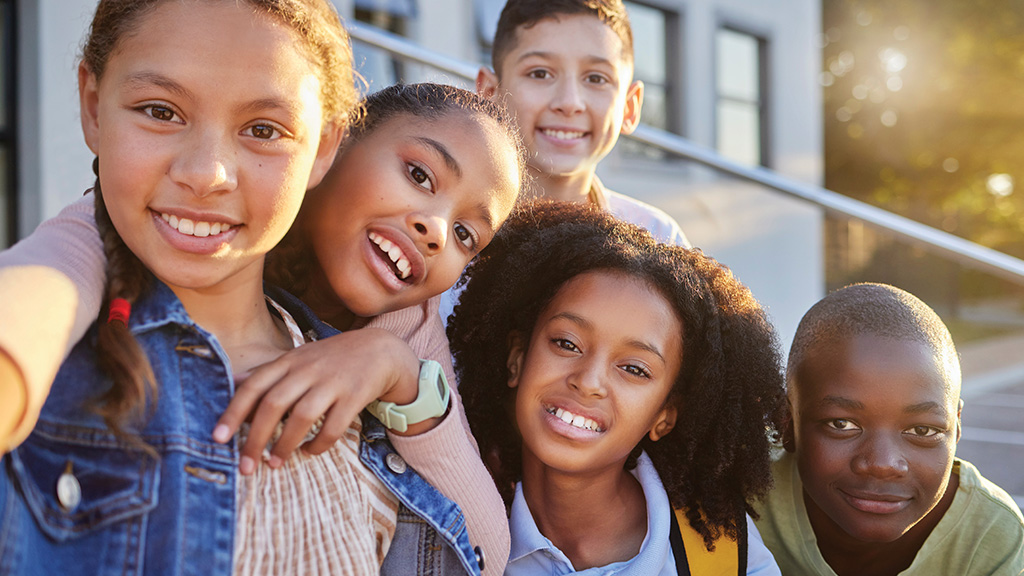
L ISMAIL/PEOPLEIMAGES.COM/STOCK.ADOBE.COM
Last year, a viral video circulating in my community showed two teen girls fighting a third at the local high school, their fists flying. I learned that one of the girls had been filmed previously violently fighting others. I found myself experiencing a range of emotions. As a mother, I was concerned about the well-being of my child, who attends that high school. Since I, like so many of my peers, consider myself an “other mother” to my friends’ children, I also worried about the well-being of those young people. I felt a visceral desire to protect the girl, a young person of color, who had been filmed fighting. I wondering what led her to fight, again and again. What was being done to help her social and emotional well-being? How was the school system supporting her so that she could thrive academically?
This example and countless others highlight the deep trauma that students are experiencing. During the pandemic, school-aged youth lost loved ones, stability, and their sense of security. And while all students felt these impacts, studies show that schools serving low-income families and Black and Latinx students experienced the negative effects of the pandemic more acutely, with educational inequities deepening even further. The return to in-person schooling was marked by calls for a focus on mental health and social-emotional learning. However, results on the National Assessment of Educational Progress Long-Term Trend exams showed significant decline in reading and math among 13-year-olds, (compared to 2019-20 results, and even sharper declines when compared to a decade ago), which spurred a renewed emphasis on testing and accountability measures. Citing concerns about learning loss, many school districts have shifted from addressing social-emotional needs of children to focusing on academics.
Wanting our children to do well academically is important. Yet this approach to schooling simply isn’t enough to get young people like the girl I saw fighting in the video back on track, assuming that she was ever on track to begin with. Young people across our country have been struggling for quite some time, which the pandemic only exacerbated. The Centers for Disease Control and Prevention (CDC) Youth Risk Behavior Survey Data Summary & Trends Report: 2011-2021 highlighted alarming mental health and well-being youth trends, especially among historically marginalized racial and ethnic groups, LGBTQIA+ youth, and girls. Specifically, the CDC found that persistent sadness, suicidality, and suicide attempts were especially high among these sub groups.
I suggest we need a different approach to schooling. What we need is Radical Care, a framework of schooling that includes five interdependent components: adopting an anti-racist stance, cultivating authentic relationships, believing in students’ and teachers’ capacity for excellence, leveraging power strategically, and embracing a spirit of radical hope.
1. Embracing an anti-racist stance: At the core of Radical Care is a commitment to ant-iracism, and an understanding of how systematic racism has led to the inequitable distribution of resources and opportunities in schools. Educators who embrace anti-racism engage in reflective practice to consider how racism has shaped their identity and work to engage their colleagues in self-reflection as well. They take a critical look at how seemingly race-neutral policies like teacher assignment, disciplinary codes, and student selection for advanced course work, among others, are influenced by race, frequently at the expense of students of color.
2. Cultivating authentic relationships: Typically, educators’ relationships with students focus on how students are performing academically. In contrast, practicing Radical Care means building authentic relationships with the student as a whole person, not just their academic identity. If we want students to be successful, we must commit to knowing them deeply. If we focus on how students are doing academically and ignore other aspects of their lives, their academics and mental health will continue to suffer.
3. Believing in students’ and teachers’ capacity for excellence: Once educators have cultivated authentic relationships with their students, they can leverage these relationships to push for excellence. Demanding excellence in Radical Care begins with educators’ fundamental belief in students’ brilliance and their capacity to continuously improve. Educators can identify the structural barriers that impede students’ ability to achieve success, and work to dismantle them. Educators also must believe in their own capacity for excellence and ability to meet the needs of their students.
4. Leveraging power strategically: Practicing Radical Care also requires that educators leverage their power to make changes in their schools, while also advocating for change at the systemic level. Here again, adopting an anti-racist stance helps educators critically analyze and recognize the structural inequities that perpetuate oppression among the most marginalized students, most notably Black and Latinx youth and low-income students.
5. Embracing a spirit of radical hope: Last, Radical Care requires maintaining a spirit of radical hope, especially in the face of staggering statistics and realities. Being an educator can be disheartening, and it is even more so for those who work in historically underserved districts. Radical hope is the unwavering belief in what is possible and is at the core of dreaming for and working towards a more just and equitable school system for all children.
Contrary to popular narrative, a return to pre-pandemic normalcy is not the best thing for many Black and Latinx youth and low-income students. If we are to transform schools so that young people like the girl filmed fighting can achieve their full potential, schools must begin practicing Radical Care.
Rosa L. Rivera-McCutchen (rosaphd07@gmail.com) is a professor of administration and supervision, Hunter College CUNY, and author of Radical Care: Leading for Justice in Urban Schools (Teachers College Press, 2021). She delivered the opening keynote at the 2023 CUBE Conference.

Share this content